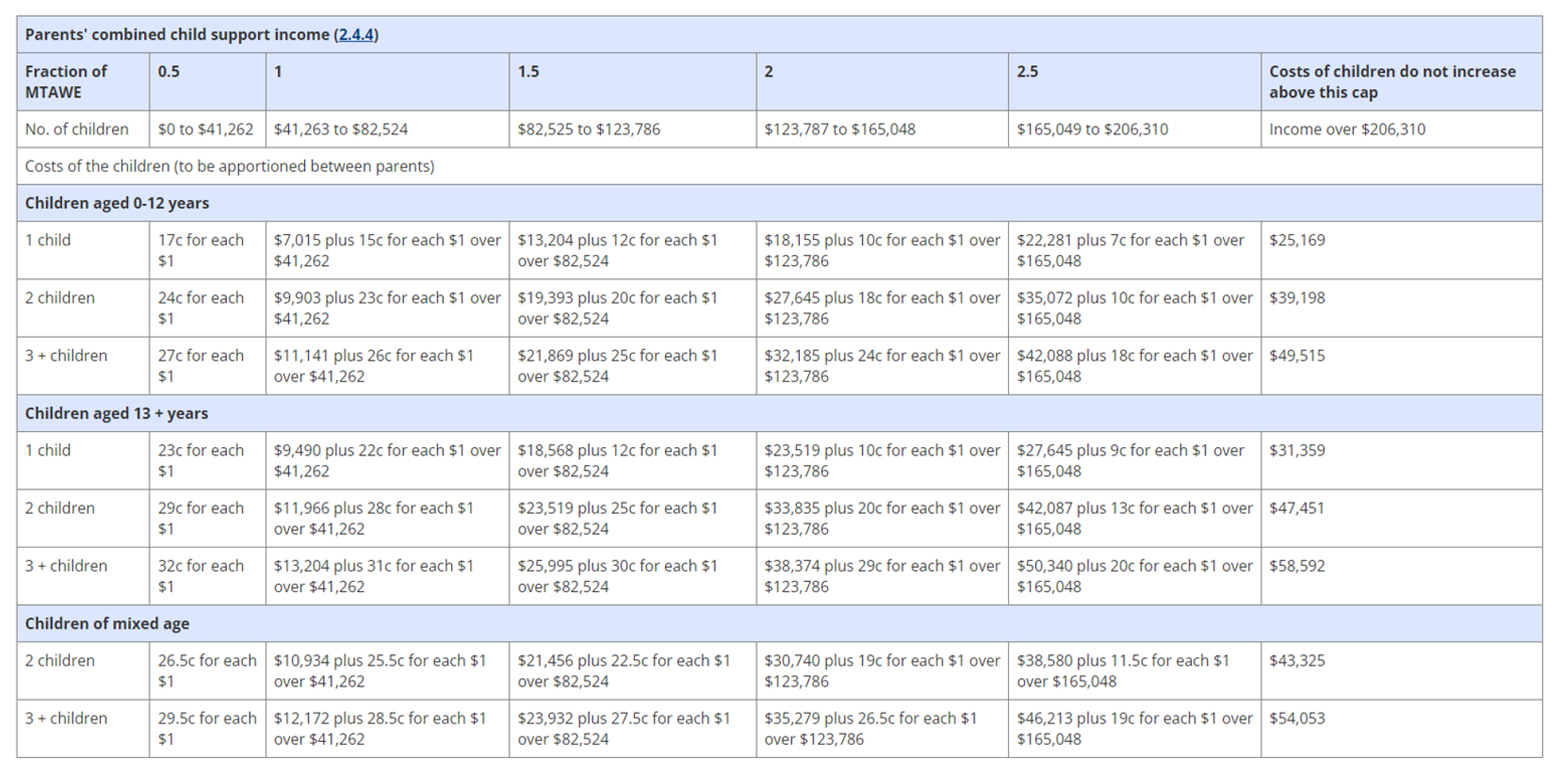Child support is a crucial and often complex issue when parents separate or divorce. In Australia, the child support system plays a vital role in ensuring the financial well-being of children in such situations. It’s essential to understand how child support works, how payments are calculated, and the factors that influence the amount a father pays for child support. In this comprehensive guide, we’ll explore child support in Australia in detail.
Child Support in Australia: An Overview
Child support in Australia is governed by the Child Support (Assessment) Act 1989 and administered by Services Australia. The primary goal of this system is to provide financial support to children by one or both parents after separation or divorce. The payments are designed to cover the costs of raising a child, including education, healthcare, food, clothing, and other essential expenses.
How Is Child Support Calculated in Australia?
Child support payments in Australia are calculated using a formula established by the Child Support (Assessment) Act 1989. This formula takes several factors into account, including:
- Income of Both Parents: One of the most critical factors in determining child support payments is the income of both parents. This includes wages, rental income, and investments.
- Number of Children Requiring Support: The more children requiring support, the higher the overall child support obligation.
- Percentage of Care Each Parent Provides: The number of nights a child spends with each parent is used to determine the percentage of care. The parent with the lower percentage of care is generally the paying parent.
- Ages of the Children: The age of the children also affects the amount of child support required, as older children typically have higher living expenses.
The Child Support Agency (CSA), which is now part of Services Australia, administers this formula. Parents can use the CSA’s online Child Support Calculator to estimate their child support obligations. Keep in mind that income can be self-assessed or assessed by the CSA if there are disputes or concerns about accuracy.
ALWAYS KNOW YOUR RIGHTS AND KNOW WHERE YOU STAND
By consulting one of our accredited family law mackay specialists.Costs of the Children Table 2023

Source: Child Support Guide
ALWAYS KNOW YOUR RIGHTS AND KNOW WHERE YOU STAND
By consulting one of our accredited family law mackay specialists.What Things Does Child Support Cover?
 Child support in Australia is intended to cover various expenses associated with raising a child and ensuring their well-being. While child support payments may not cover every expense, they contribute significantly to the child’s financial support. Here are the key things that child support typically covers:
Child support in Australia is intended to cover various expenses associated with raising a child and ensuring their well-being. While child support payments may not cover every expense, they contribute significantly to the child’s financial support. Here are the key things that child support typically covers:
1. Basic Necessities: Child support is expected to cover basic necessities, including:
- Food: Child support helps provide a child with nutritious meals and snacks.
- Clothing: Funds can be used for purchasing clothing, shoes, and other essential apparel.
- Shelter: Child support contributes to the cost of housing, including rent or mortgage payments.
2. Education: Child support can be used to support a child’s education, covering expenses such as:
- School Fees: This includes tuition fees and any associated costs like textbooks and school supplies.
- Uniforms: Payments can help purchase school uniforms or other required clothing for school.
- Extracurricular Activities: Funds may be used for enrolling a child in extracurricular activities like sports, music lessons, or art classes.
3. Healthcare: Child support helps cover healthcare-related expenses, including:
- Medical and Dental Care: Payments contribute to the costs of doctor’s visits, dental check-ups, and necessary treatments.
- Prescription Medications: Funds can be used to purchase prescription medications for the child.
- Health Insurance: Child support can assist in paying for health insurance premiums or out-of-pocket medical expenses not covered by insurance.
4. Childcare and Supervision: Child support can be used to cover childcare expenses, including:
- Childcare Services: Payments can help pay for daycare or after-school care when needed.
- Supervision Costs: If a child requires supervision during certain periods, such as school holidays, child support can contribute to these costs.
5. Transportation: Child support can assist with transportation expenses, such as:
- Public Transport: Funds can be used for public transportation costs or other transportation-related expenses.
- Car Costs: Payments may help cover the expenses of maintaining a vehicle, which is used for transporting the child.
6. Special Needs: In cases where a child has special needs, child support may be directed towards specific expenses related to those needs. This could include therapy, specialized equipment, or additional support services.
7. Child’s Recreation: Child support can contribute to the child’s recreational activities and leisure pursuits, allowing them to participate in age-appropriate and enjoyable pastimes.
8. Unexpected Expenses: In some situations, child support may also be used to cover unforeseen or unexpected expenses that are necessary for the child’s well-being.
It’s important to note that while child support is designed to cover a wide range of expenses, parents are encouraged to cooperate and communicate to ensure that the child’s needs are met effectively. Additionally, child support payments should be used exclusively for the benefit of the child and their well-being. Both parents have a shared responsibility to ensure that the child’s needs are adequately addressed, and child support is a financial contribution towards fulfilling this responsibility.
Income Assessment
Income assessment plays a significant role in calculating child support payments. It’s crucial for both parents to provide accurate information about their income. If a parent is found to be underreporting or hiding income, the CSA can take legal action and adjust child support payments accordingly.
Care Arrangements
The percentage of care each parent provides is another crucial element in calculating child support payments. This percentage determines how many nights a child spends with each parent. For example, if a child stays with one parent for 60% of the time, that parent is generally considered the primary carer. The paying parent will typically have a higher child support obligation.
Payments and Adjustments
Once the CSA calculates the child support payment, it can be made directly between the parents, or the CSA can collect and transfer payments. The CSA also has the authority to make adjustments to child support payments based on various factors:
- High Costs of Contact: If one parent incurs significant expenses to maintain contact with the child, these expenses may be taken into account, potentially reducing their child support obligation.
- Capacity to Earn Income: If a parent has the capacity to earn more income but is deliberately not doing so to reduce child support payments, the CSA may assess their earning capacity and adjust the payments accordingly.
- Special Circumstances: In certain cases, such as when a child has special needs, the CSA can make adjustments to account for these additional costs.
Conclusion
Child support in Australia is a carefully regulated system that prioritizes the financial well-being of children when their parents separate or divorce. The formula for calculating child support payments takes into account the income and care arrangements of both parents, with the goal of providing stability and financial security for children. Understanding how child support works is essential for parents navigating the challenges of separation or divorce, as it ensures the best interests of their children are met. If you have further questions or concerns about child support in Australia, consider consulting with a legal professional or contacting A Family Lawyers Mackay.
ALWAYS KNOW YOUR RIGHTS AND KNOW WHERE YOU STAND
By consulting one of our accredited family law mackay specialists.Frequently Asked Questions (FAQ) About Child Support in Australia
Q1: What Happens If One Parent Doesn’t Pay Child Support in Australia?
A1: If a parent fails to make child support payments, the CSA has enforcement options to ensure compliance. These options may include garnishing wages, intercepting tax refunds, or taking legal action if necessary. The CSA is committed to ensuring that children receive the financial support they need.
Q2: Can Child Support Orders Be Changed in Australia?
A2: Yes, child support orders can be changed if circumstances change significantly. Parents can apply for a change if their income, care arrangements, or other relevant factors have changed substantially. It’s important to notify the CSA of any changes promptly to prevent overpayments or underpayments.
Q3: Are Child Support Payments Tax-Deductible in Australia?
A3: No, child support payments are not tax-deductible for the paying parent, nor are they considered taxable income for the receiving parent. Child support payments are treated separately from tax matters.
Q4: Can Child Support Payments Be Used for Anything in Australia?
A4: Child support payments are intended to cover the costs of raising a child, including but not limited to food, clothing, housing, education, and medical expenses. These payments should be used for the child’s benefit and well-being.
Q5: Can Parents in Australia Make Private Child Support Agreements?
A5: Yes, parents in Australia can make private child support agreements. These agreements allow parents to negotiate their own child support arrangements outside of the standard formula. However, these agreements must be registered with the CSA to ensure they meet legal requirements and protect the child’s best interests.














